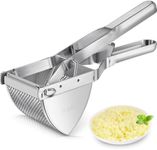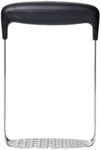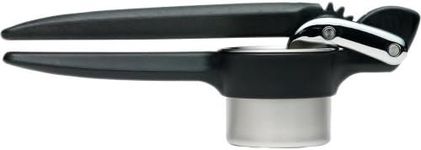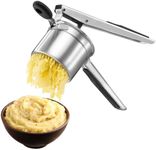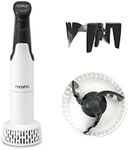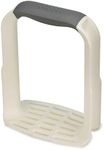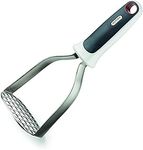Buying Guide for the Best Potato Mashers
Choosing the right potato masher can make a big difference in your kitchen, especially if you frequently prepare mashed potatoes or other mashed foods. The right masher will help you achieve the desired texture and consistency with minimal effort. When selecting a potato masher, consider the type of food you will be mashing, your hand strength, and how often you plan to use it. Here are some key specifications to consider when choosing a potato masher.MaterialThe material of a potato masher is important because it affects durability, ease of cleaning, and how it interacts with your cookware. Common materials include stainless steel, plastic, and silicone. Stainless steel mashers are durable and effective for mashing, but they can scratch non-stick cookware. Plastic and silicone mashers are gentler on non-stick surfaces but may not be as sturdy. Choose a material that suits your cookware and your preference for durability and maintenance.
Handle DesignThe handle design of a potato masher affects comfort and ease of use. Handles can be made from materials like plastic, wood, or rubber, and may have ergonomic designs to reduce hand strain. A comfortable grip is important if you plan to mash large quantities or have limited hand strength. Look for a handle that feels comfortable in your hand and provides a secure grip, especially if you have specific ergonomic needs.
Mashing Plate DesignThe design of the mashing plate determines the texture of the mashed potatoes. There are two main types: wire and perforated. Wire mashers have a zigzag or grid pattern and are great for achieving a chunkier texture. Perforated mashers have holes and are better for smoother results. Consider the texture you prefer in your mashed potatoes and choose a mashing plate design that will help you achieve it.
SizeThe size of the potato masher affects how much food you can mash at once and how easy it is to store. Larger mashers can handle more potatoes at a time, which is useful for big families or gatherings, but they may be harder to store. Smaller mashers are easier to store and handle but may require more effort for large batches. Consider your storage space and the typical quantity of food you mash when choosing the size.
Ease of CleaningEase of cleaning is an important factor, especially if you use your potato masher frequently. Some mashers are dishwasher safe, while others require hand washing. Mashers with fewer crevices are generally easier to clean. If you prefer low-maintenance kitchen tools, look for a masher that is easy to clean and possibly dishwasher safe.
